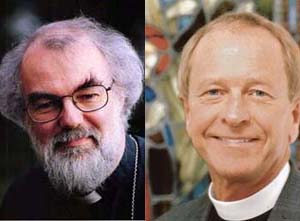
|
|
|
|
|
|
10. Continuing Transgender Violence
9. Syphilis and Staph Infections AIDS has been with us for a couple of decades now, and STDs go back centuries. But 2003 marked not only an increase in syphilis, but an outbreak of drug-resistant staph infections among gay men. The aggressive Methicillin-resistant staphylococcus aureus (MRSA) bacteria spreads via skin-to-skin contact, resulting in unattractive sores, boils, and rashes. A $1,500 dose of Zyvox kills the bacteria. (No medical insurance? Tough luck.) Was MRSA transmitted sexually? Probably, given the body parts where many gay men contracted it, but no one dared say so publicly. The story peaked by summer, but how could we so quickly forget the health precautions that halt the spread of STDs?
7. Constitutional Amendment Proposed "Protecting" Marriage from Gay Couples In May, Marilyn Musgrave (R-CO) introduced the Federal Marriage Amendment in the House of Representatives, intending to amend the U.S. Constitution to ban same-sex marriage and government recognition of civil unions and/or domestic partnerships. After three consecutive years without Senate sponsorship, Republican Majority Leader Bill Frist (R-TN) extended support for the bill, followed by President George W. Bush, who called gays "sinners" before proclaiming October 12-18 "Marriage Protection Week." (Apparently they've all forgotten 1996's Defense of Marriage Act (DOMA), defining marriage as being between a man and a woman only.) Fortunately, Constitutional amendments are notoriously difficult to pass (requiring ratification by 2/3 of each Congressional house plus approval by ¾ of the states' Legislatures - we've only had 17 in the past 200 years), so in the end, it's likely just a waste of hot air (enough to float the Hindenberg!). 6. Queer Eye for the Straight Guy
 Call it the little show that could. Queer Eye's Ted Allen (food/wine), Kyan Douglas (grooming), Thom Filicia (interior design), Jai Rodriguez (culture), and especially big queen Carson Kressley (fashion) take a straight man (usually referred by wife or girlfriend) and turn him gay! Well, not exactly: As Carson says, "We don't turn these guys into something that they are not …. We take who he is and make him better." Debuting on Bravo, corporate parent NBC liked Queer Eye so much it aired episodes on the major network. Remember the controversy about Ellen? Ancient history.
Call it the little show that could. Queer Eye's Ted Allen (food/wine), Kyan Douglas (grooming), Thom Filicia (interior design), Jai Rodriguez (culture), and especially big queen Carson Kressley (fashion) take a straight man (usually referred by wife or girlfriend) and turn him gay! Well, not exactly: As Carson says, "We don't turn these guys into something that they are not …. We take who he is and make him better." Debuting on Bravo, corporate parent NBC liked Queer Eye so much it aired episodes on the major network. Remember the controversy about Ellen? Ancient history.
5. California Passes AB-205 With Gov. Gray Davis's signature on September 19, California's Domestic Partnership Rights and Responsibilities Act grants state (but not federal) legal protections to resident couples (second in the nation behind Vermont's civil unions, but potentially protecting many more relationships). Principal author Jackie Goldberg's bill passed the Assembly in June and the Senate in September, providing protections in about 400 areas, including child custody, health insurance, property law, bereavement leave, and governmental benefits (but not tax returns). But since California voters recalled Davis in October, new Governor Arnold ("Terminator") Schwarzenegger's comments indicating that he would have vetoed the bill ("I believe gay marriage should be between a man and a woman") may leave those protections subject to change, particularly as the Act does not take legal effect until January 1, 2005. 4. Episcopal Church Elects Openly Gay Rev. V. Gene Robinson Bishop
Ordained in 1973, Robinson came out in 1986, and has been with his male partner for fourteen years. Robinson says, "I think I can do more for gay and lesbian people in the church by being a good bishop than by being a gay bishop." Episcopalians consecrated Robinson on November 2 amid protests from conservatives and an increasing likelihood of a worldwide church schism. Will the controversy cause Robinson to resign? Hardly: he says, "I can't step down now. I'm a bishop until the day I die." Robinson plans to assume the bishopric on March 7, 2004, upon the current bishop's retirement. Stay tuned. 3. Massachusetts Supreme Court Authorizes Gay Marriage In early 2001, as part of a concerted effort, seven same-sex couples were denied marriage licenses in Massachusetts. Accordingly, they brought a lawsuit against the State, but in May 2002 a Superior Court judge ruled that state law did not convey rights of marriage for gay couples. Plaintiffs appealed to the Massachusetts Supreme Court, who heard oral argument on March 4, 2003 in Goodridge v. Department of Public Health to determine whether Massachusetts should permit gay marriages (not just civil unions, as in Vermont, or domestic partnerships, as in California). Observers waited expectantly every Monday (when the Court issues its rulings) until November 18, when Chief Justice Margaret Marshall's opinion ruled that "Limiting the protections, benefits, or obligations of civil marriage to opposite-sex couples violates the basic premises of individual liberty and equality under law protected by the Massachusetts Constitution." The Court gave the Massachusetts Legislature 180 days "to take such action as it may deem appropriate in light of this opinion," so implementation should occur in 2004 (unless the Legislature pulls a surprise from its collective sleeve). How will this decision play on a national stage next year? 2. Canada Passes Gay Marriage Law
 First Holland and then Belgium permitted same-sex couples to wed, under certain conditions, and with little more than token recognition in the States. Taiwan prepares to do so next year. But when Canada made an even broader decision, Americans took notice. On June 17, 2003, Canadian Prime Minister Jean Chrétien announced that his government would not challenge an Ontario Court of Appeals ruling permitting same-sex couples equal marriage rights with opposite-sex couples (following similar rulings in Quebec and British Columbia). Several notable American couples packed their bags and got hitched this summer, including Rev. Troy Perry, singer Janis Ian, columnists Deb Price and Marc Acito, 1960s activist Martha Shelley, and their respective partners. (Oh, yeah, some gay Canadians married, too!) Those crazy South Park guys won an Oscar for their song, "Blame Canada," but instead, we should praise our northern neighbors for their brave, principled stance supporting marriage equality!
First Holland and then Belgium permitted same-sex couples to wed, under certain conditions, and with little more than token recognition in the States. Taiwan prepares to do so next year. But when Canada made an even broader decision, Americans took notice. On June 17, 2003, Canadian Prime Minister Jean Chrétien announced that his government would not challenge an Ontario Court of Appeals ruling permitting same-sex couples equal marriage rights with opposite-sex couples (following similar rulings in Quebec and British Columbia). Several notable American couples packed their bags and got hitched this summer, including Rev. Troy Perry, singer Janis Ian, columnists Deb Price and Marc Acito, 1960s activist Martha Shelley, and their respective partners. (Oh, yeah, some gay Canadians married, too!) Those crazy South Park guys won an Oscar for their song, "Blame Canada," but instead, we should praise our northern neighbors for their brave, principled stance supporting marriage equality!
1. U.S. Sodomy Laws Repealed in Lawrence v. Texas While Illinois was the first state to repeal its sodomy laws (in 1961), no concurrent federal repeal occurred; accordingly, uncoordinated statewide efforts paralleled attempts to eliminate anti-slavery laws plantation by plantation. Finally, this year, our Brown v. Board of Education came in!
 Paul D. Cain is the author of Leading the Parade: Conversations with America's Most Influential Lesbians and Gay Men, Scarecrow Press, 2002
Paul D. Cain is the author of Leading the Parade: Conversations with America's Most Influential Lesbians and Gay Men, Scarecrow Press, 2002
|
 Jessica Mercado
Jessica Mercado  NGLTF Matt Foreman
NGLTF Matt Foreman  The Archbishop of Canterbury Rowan Williams and openly-gay Bishop Gene V. Robinson
The Archbishop of Canterbury Rowan Williams and openly-gay Bishop Gene V. Robinson  Tyron Garner and John Geddes Lawrence won their case before the U.S. Supreme Court, which overturned sodomy laws throughout the nation
Tyron Garner and John Geddes Lawrence won their case before the U.S. Supreme Court, which overturned sodomy laws throughout the nation